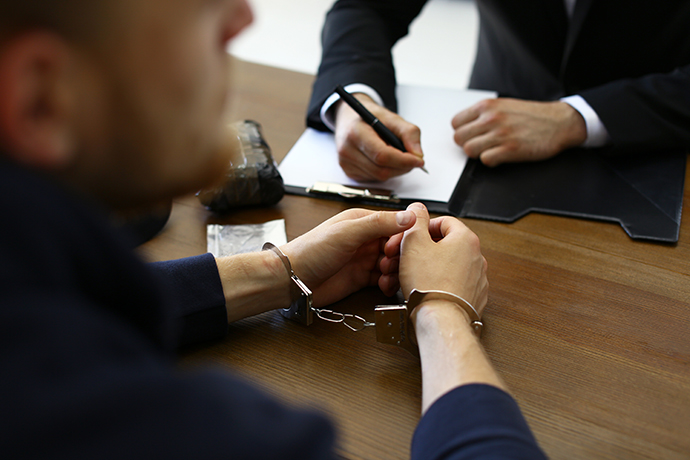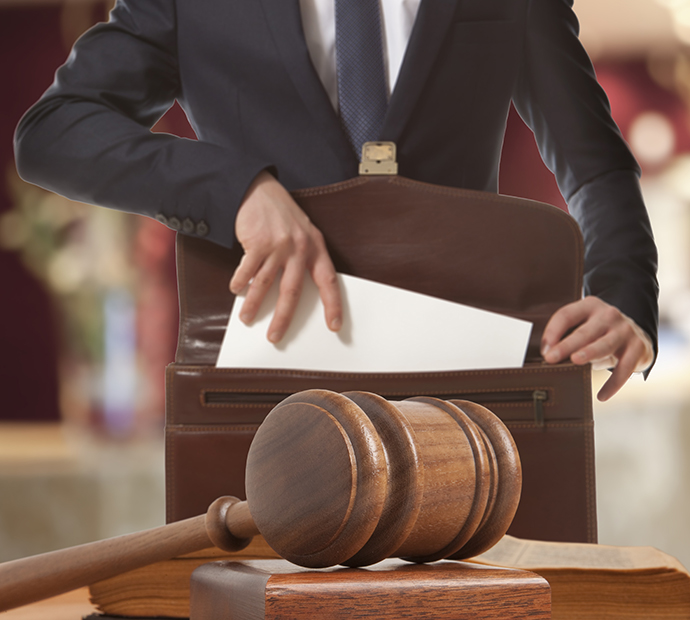Available To Help 24/7 Call (201) 792–3333
Contact us to get your free, no obligation consultation
Facing criminal charges can be a confusing and frightening experience. Getting charged with a crime is just the beginning, and you may be worried about what will happen next. Perhaps the most important thing to remember is that you have rights, including the right to an attorney. A skilled criminal defense attorney can help you through the entire criminal process from start to finish.
If you or someone you care about is facing any type of criminal charge in New Jersey, it is crucial to obtain skilled legal representation. Contact the experienced attorneys at Sarofiem & Antoun, LLC today to discuss how we can help you defend your rights and navigate the criminal justice system.

The criminal process in New Jersey typically begins with a complaint that alleges a person committed some type of crime, which leads to criminal charges and arrest. Where the process ends depends a lot on the charges and the circumstances of the case, but cases can continue until there is a dismissal, a plea, or a trial. Below each step of the New Jersey criminal process is explained.
A criminal case generally begins when a complaint is filed by the police, or even a citizen, alleging that a person committed a crime. This formal complaint leads to criminal charges, which often results in an arrest. Sometimes, the arrest comes first. If police officers see a person commit a crime, or have probable cause a person has committed a crime, officers can arrest that person at the scene. Then the complaint and formal charges will follow.
After a person is charged with a crime, they will be required to make an initial appearance before the court. If the person is arrested and in custody, this appearance should happen within 48 hours. At this first appearance, the judge will:
When determining whether a person should stay in custody until their trial the judge will look at several factors including the crime committed, the person’s criminal history, and their connections to the community. In some cases, the person is released on their own recognizance, meaning they can leave but are responsible for appearing at later hearings. In other cases, bail is set. If a person can pay their bail, they can be released while awaiting trial. If the bail cannot be paid, they must remain in custody.


The next step in the criminal process involves looking over the case and deciding the next steps. The prosecutor will take time to look over the case and decide if they want to move forward with the prosecution. At this point, several different things can occur:
If the case moves forward, the next step is the grand jury and indictment process. At this point, the prosecutor brings together a group of citizens to make up the grand jury. The prosecutor presents evidence of the charges to the grand jury. The grand jury then decides whether there is enough evidence to formally charge a defendant and move forward with the case. If the grand jury decides there is enough evidence, this does not mean that the defendant is guilty, but just that the case moves forward. If the grand jury decides there is not enough evidence to indict, the charges are dismissed.
After a grand jury indictment moving the case forward, the defendant has an arraignment. At the arraignment, the defendant is formally notified of their charges. The defendant can choose to move forward toward a trial, or choose to enter a guilty plea. If they enter a guilty plea, sentencing follows a few weeks later.


After the arraignment, there is another opportunity for further pre-trial conferencing and negotiation. The prosecutor and the defendant’s attorney discuss the case and may at this point negotiate a plea bargain. The defendant has another opportunity to plead guilty or instead move forward to trial.
If the case has not been resolved previously, the next step is going to trial. At the trial, the prosecutor must prove beyond a reasonable doubt that the defendant is guilty of his charges. With the help of a skilled New Jersey criminal defense attorney, the defendant can present a defense to the prosecutor’s claims. After the prosecutor and defense present their sides, the jury makes a decision. The defendant is found guilty or not guilty. If the defendant is found not guilty, the defendant’s case ends. If the defendant is found guilty, the final steps of the criminal process include sentencing or post-trial appeals.
The criminal process can be complicated and the idea of facing charges on your own can feel totally overwhelming. However, it is important to remember that if you are charged with a crime you have a right to an attorney from the very start—you don’t have to tackle any part of the potentially long process on your own.
The skilled New Jersey criminal defense attorneys at Sarofiem & Antoun, LLC can help you navigate your criminal case from the moment of your arrest or charges. They will be by your side every step of the way and diligently work to provide a defense that leads to the best possible outcome in your case. If you are facing criminal charges of any kind, reach out to our office today by calling (201) 792-3333. We are available 24/7 by phone or text to discuss your case during a free, totally confidential consultation!



Free Case Evaluation and Legal Advice in Jersey City
Contact our firm
I hired Mr.Mekhail when I found myself incarcerated for some heavy charges that I didn’t do. I wanted to give up and just let it…
ANGEL ESCALERA
I had spoken to Mr. Sarofiem in regards to a financial agreement/contract I had signed. He was very helpful, polite and broke my situation down…
NAMRA V
I seek professionals not only for their experience but also their ability to understand my personal situation. Something I can truly appreciate is the fact…
F KHELLA
I am so glad that I hired Sarofiem & Antoun! I have never been in trouble with the law before and it was really a…
DJIBRIL SARR
Mr. Sarofiem is one of the best professional attorneys there is. He works very professionally and speedy. I had no idea what to do or…
VICKY ROSE
I was referred to Kero Antoun from my close friend who went to Law school with him. She did not specialize in criminal and traffic…
BEVERLY LACSINA
I highly recommend this law firm and Mr. Sarofiem, to anyone who is in need of a lawyer. The service and care was truly unmatched.…
M A
The service we received from attorney Mekhail ended with a piece of mind, which is something I was longing for. Thank you Thank you Thank…
EMAN AHMEDD
The best decision we made was to retain Mr. Sarofiem. He stuck to his guns, protected us and got the changes accomplished when we didn’t…
LORRAINE PELASKE
This is my first time using a lawyer and it was definitely a positive experience. Kero was calm cool and collective. He made me feel…
VISUAL EXCELLENCE AUTOMOTIVE DETAILING
Had an excellent experience with this firm. Very knowledgeable attorneys, prompt on their responses, and for very reasonable prices. After initial consultation, the entire process…
DANNY SAAD
Can’t thank these guys enough for the level of service they provided. Professional, efficient, and effective!! Making multiple appearances, filing several motions, exhausting every possible…
ANDREW MICHAEL
Very professional and always strive to find Justice. Not to long ago Mekhail helped me with a case that had a very grim outcome if…
AL SANTO
I have never been through the process before, but he helped me every step of the way. As someone who didn’t have much time, Mr.…
BRIAN MOLINA
They were very professional and I am pleased with the service they provided.
AHMED HAMDI
Mr. Sarofiem was extremely compassionate, respectful and responsive. I recommended Mr. Sarofiem to anyone who needs a lawyer.
EDUARDO DOROTEO
It was a pleasure working with Mr. Sarofiem. He worked thoroughly and efficiently with all parties involved. Best of all he communicated with me throughout…
PETER SAAD
Sarofiem & Antoun are both excellent and experienced Lawyers. They were very helpful and informative. Excellent Service! Would recommend to anyone.
PAUL BAPANA
Mr. Sarofiem is so professional and educated. Won’t stop using him. He’s the best!
PHILLIP MICHAEL
His firm was very professional throughout the entire process and talked to me every step of the way. Kero is my attorney for life.
JULIO MORALES-CARRERA
Mekhail Sarofiem, he’s ambitious and works hard for your case till the very end doing the very best he can till your satisfied. I highly…
OMAR OLABI
The lawyers were very understanding and professional. They handled my case from a-z and kept me informed. I would recommend this law firm to anyone…
SHENOUDA SAADALLA
Kero was very professional and efficient I highly recommend him.
GOMEZ GOMEZ
Mekhail worked with my budget and always kept me updated on what was going on. I will be recommending him to anyone I know who…
MIRIAM GERGES
I hired Mr. Antoun for my case. He guided me every step of the way. He was more than just a lawyer. He actually cared.…
MOUSSA SACKO
Mekhail kept me informed every step of the way all the way to my trail. Mekhail even knew about my financial situation and worked with…
MOHAMED FOFANA
I highly recommend this law firm. Finally an attorney who cares!
ALEXANDER MALO
I hired Mr. Antoun for my case and it was the best decision I ever made. No miscommunication, great guys really cares about his client.
LO THE KID
I’d recommend Mekhail to anyone who’s looking for an attorney that genuinely cares about each individual case.
PAUL GOMEZ
I hired Mr. Antoun for a case. His services were exceptional. Very personable and professional. Would definitely hire him again in the future. Thank you…
FRANCESCA RENEE
Very professional Attorney and very good service .. was so good experience using Mekhail Sarofiem .. Thank you for the good job you did!!
MINA ELKOMOS
Great lawyers, even better people. Very professional, responsive, and punctual. AND, they represent the city & respective communities rather than just having an office/working there.…
LEVEL UP VISION
Mekhail was efficient, professional, and personable. Excellent response to questions, patient, and competent. I highly recommend him without any reservations, a pleasure to work with.
CHRISTINA MOUSSA
Kerollos Antoun fought endlessly for me. Walked into a hostile environment and fought hard for me. Other people in court came up to me after…
BABACAR NDIAYE
I had a great experience with the attorneys at this law firm, they were very professional and had my interest at heart and showed up…
ROYALTY MOTORS
I am extremely thankful for Mekhail’s services. I recommend him to anyone that needs a lawyer.
SAMY MOHAREB
I’m truly blessed in making the decision to work with these guys.
MÃRQUISE LEE
I almost wanted to give up but Mekhail stood on the ground for me until we were done. Thank you Sir really appreciate your hard…
HILDA FERNANDES
I could not thank Mr. Antoun enough and would highly recommend his office to anyone in New Jersey.
ABUALHASSAN MOHSEN
The lawyers in this office are very professional and knowledgeable. Not only were they able to add value but gave me a sense of comfort…
GEORGE SAED
The effectiveness and courtesy of Sarofiem & Antoun, LLC displays a standard which service companies must be held to. Absolutely flawless in their practice. Relived…
MATTHEW SEFIN
had a wonderful experience with Mekhail . He was very professional and hands on… I will definitely recommend him to friends and family.
NATALIA EADDY
Mr. Antoun was very professional in handling my issue. He even took it upon himself to contact me every step of the way with updates.…
MENA IBRAHIM
very understanding and communicated with me regularly until my case was complete. I am very happy with their services and would recommend anyone that needs…
DEREK HADEN
Mr. Antoun is very Professional, Respectful, and Organized. He even gave me a courtesy call the day before court to remind me & day of.…
JOE MINICKENE
This guy is just an awesome human being and a lawyer that literally does whatever he can do for his clients… Mr. Sarofiem will be…
ANDREW GIRGIS